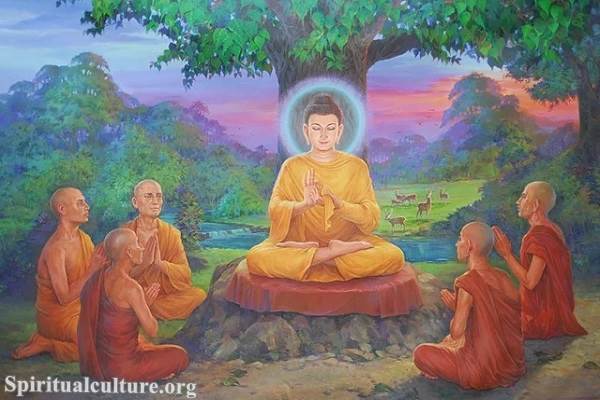Life moves like the wind — unpredictable, ever-changing, and sometimes stormy. In Buddhist teachings, this metaphor is deeply explored through what are known as the Eight Worldly Winds. These eight conditions, blowing through our lives with varying intensity, are not just circumstances — they are teachers, showing us where we cling, where we fear, and where we might awaken.
As Spiritual Culture, we invite you on a reflective journey into these Eight Worldly Winds — not to resist them, but to understand their nature and how they shape our inner landscape. In doing so, we uncover the deep wisdom of equanimity, a central quality in Buddhist practice, and learn to walk the middle path amidst all extremes.
This article will illuminate the meaning of each of these winds, their impact on our mind and emotions, and how the Buddha taught us to navigate them with compassion and insight.
What Are the Eight Worldly Winds?
The Four Pairs That Move the Human Heart
The Eight Worldly Winds (also known as the Eight Vicissitudes) are paired opposites:
- Gain and Loss
- Praise and Blame
- Fame and Disgrace
- Pleasure and Pain
They are called “winds” because, like the natural wind, they are inconstant and out of our control. They blow through every life — no matter how spiritual, how wealthy, how secluded, or how disciplined.
These winds represent the worldly experiences that can disturb our peace if we grasp at them or push them away. In Buddhist psychology, such reactions are rooted in attachment and aversion — the very roots of suffering.
As the Lokavipatti Sutta (AN 8.6) explains:
“Gain, loss, status, disgrace, censure, praise, pleasure, and pain: these conditions among human beings are inconstant, impermanent, and subject to change.”
Let us now examine each wind and what it reveals.
Gain and Loss: The Winds of Fortune
Gain: The Seduction of Having More
Gain feels good — be it money, success, relationships, or recognition. The world praises gain as victory. Yet in the Dharma, gain is seen not as a final triumph, but a temporary occurrence. When we cling to gain as a measure of our worth, we suffer when it inevitably shifts.
“Attachment is the root of suffering.” — The Buddha
We must ask: Do I possess this, or does it possess me?
Loss: The Teacher of Letting Go
Loss is often seen as misfortune — the ending of something we valued. But in the Dharma, loss is also a door. It shows us impermanence directly. It invites us to discover what remains when what we clung to is gone.
True freedom, the Buddha taught, is not in avoiding loss, but in seeing that what we truly are cannot be lost.
Praise and Blame: The Winds of Ego
Praise: The Sweetness That Can Spoil
Praise is like honey — delightful, affirming, and uplifting. But it can feed the ego, creating a self-image we feel we must constantly defend. Clinging to praise makes us fragile, dependent on the opinions of others.
Mindful awareness asks: Can I accept praise without becoming inflated?
Blame: The Mirror of Humility
Blame stings — especially when unjust. But it can be a mirror, revealing our defensiveness or our honesty. Can we listen to blame with clarity rather than reaction? Can we see when blame is true — and when it is not ours to carry?
Blame, rightly understood, becomes a teacher of patience, self-inquiry, and humility.
Fame and Disgrace: The Winds of Identity
Fame: The Illusion of Being Seen
Fame — or simply being known and admired — feeds our longing for significance. But in Buddhism, identity built on fame is just another mask. It shifts with public opinion and brings constant anxiety.
The Buddha warned against craving recognition, for it distracts us from awakening.
“Just as a great wind cannot shake a mountain, so the wise remain unaffected by praise or blame.” — Dhammapada 81
Disgrace: The Fear of Being Forgotten or Judged
To fall from favor, to be misunderstood — this is disgrace. It wounds our constructed identity. But for the practitioner, disgrace can be freeing. When others stop expecting us to be perfect, we stop pretending.
To embrace disgrace as part of life is to rest in the truth that we are not our image.
Pleasure and Pain: The Winds of the Senses
Pleasure: The Addictive Comfort
Pleasure is the most subtle wind — it feels so harmless. Food, entertainment, touch, warmth — all bring pleasure. But the clinging to pleasure leads to dissatisfaction. Pleasure passes. The more we chase it, the less it satisfies.
The Buddha taught not to reject pleasure, but to see it clearly — and to know when it begins to bind.
Pain: The Path to Compassion
Pain is universal. Physical pain. Emotional pain. Mental distress. But in Dharma, pain can open the heart. When met with mindfulness, it leads to compassion — for ourselves and others.
To avoid pain is to miss its message. To sit with pain is to grow in presence.
The Middle Path: Finding Stillness Amidst the Winds
Equanimity: The Heart of Freedom
Equanimity (upekkha) is the deep stillness that remains undisturbed by the winds. It is not indifference. It is spacious wisdom — a balanced mind that welcomes all experiences, not because it likes them, but because it understands them.
When we train in meditation, reflection, and ethical living, we begin to see the impermanence of all conditions. The winds may blow, but we are no longer carried away.
The Practice of Mindful Presence
To face the Eight Worldly Winds skillfully, we return to presence. When gain arises — we know it as gain. When loss comes — we know it as loss. We breathe. We see. We respond wisely.
This is the core of mindfulness: not controlling the world, but transforming our relationship to it.
Lessons from the Life of the Buddha
The Buddha himself was not immune to these winds. He experienced praise and blame, gain and loss, pleasure and pain. Yet his awakening was marked by his unshakable equanimity.
When slandered by others, the Buddha simply replied:
“If you know this to be true, then do what you think is right.”
His steadiness was not apathy — it was clarity.
What This Means for You
In your life, the Eight Worldly Winds will surely come. You will be praised, and you will be blamed. You will win, and you will lose. You will feel joy, and you will feel sorrow.
The spiritual question is not how to stop these winds, but how to stand with grace as they pass through.
So we invite you to reflect:
- Where do these winds most disturb you?
- What happens when you do not resist them?
- Can you meet change with openness instead of control?
Let the Eight Winds not be a curse, but a compass — guiding you inward to a stillness that no storm can shake.
Reflect and Reimagine
The Eight Worldly Winds are part of every human story. They do not make us less spiritual — they are part of the training ground. When we learn to meet them with mindful awareness and openhearted courage, they cease to control us.
They become the breath of awakening.
So walk gently. Notice the winds. Bless them. Learn from them. And with every breath, return to the unshakable center of your being — where peace is not the absence of wind, but the presence of presence.
With peace,
Spiritual Culture


